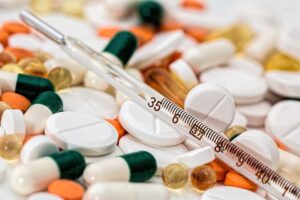How to dispose of unwanted and/or expired medications

While medications are not recyclable, responsible medication disposal is crucial for the public and environment. The easiest and often safest way to dispose of expired or unwanted medication is through mail-back programs available through area pharmacies which will then dispose of medications properly. Templeton Community Services District (TCSD) has acquired 100 mail-back envelopes for District customers to try out the system. Residents are invited to drop by the Administrative Office located at 420 Crocker Street to obtain a free envelope while supplies last. TCSD is proud to be working with the Integrated Waste Management Authority (IWMA) to protect our kids, community and waterways from the dangers of leftover prescription drugs.
Millions of people flush their unused medications down the toilet even though wastewater treatment plants and septic systems were never designed to remove pharmaceuticals (medications) from their systems or to deal with such contaminants. Wastewater percolates into groundwater, rivers, lakes, estuaries and bays. Studies show exposure to even low levels of drugs has negative effects on fish and other aquatic species, and also may negatively affect human health. The bottom line is “DO NOT” dump your medications down the drain or toilet.
The Sheriff’s Department warns that people need to be aware of the following concerns:
- Youth abusing pharmaceutical drugs that they get out of their parents’ or grandparents’ medicine cabinets
- Young children and pets accidentally ingesting medications found around the home, leading to potential poisoning
- Seniors mistakenly mixing incompatible medications or taking expired drugs that may be harmful to them
- Pharmaceutical drugs, particularly controlled substances that are taken without a prescription or a doctor’s supervision can be just as dangerous as taking illicit drugs
- Young adults (age 18-25) are the biggest abusers of prescription (Rx) opioid pain relievers, ADHD stimulants, and anti-anxiety drugs. They do it for all kinds of reasons, including “to get high” or because they think Rx stimulants will help them study better. But Rx abuse is dangerous. Young adults are dying from prescription drug (mainly opioid) overdoses.
Our goal is to stop pharmaceutical flushing that pollutes our water supplies and to eliminate unused medications unsafely stored in households, which can cause unintentional poisoning or be misappropriated. If you do not know where to go to drop off your leftover/expired medications you can go to http://www.calrecycle.ca.gov/FacIT/Facility/Search.aspx?ActivityID=41#LIST find a facility near you that accepts leftover or expired medications.
Please review the below list to learn what you can and cannot return.
ACCEPTABLE ITEMS
- Over-the-counter medications
- Prescription medications
- Medication samples
- Medication for household pets
- Medicated lotions or ointments
NON-ACCEPTABLE ITEMS
- No Needles or “sharps”
- No hazardous waste
- No thermometers
- No empty containers
- No personal care items i.e., shampoo, soaps, or perfumes
Sources: Earth911, Cal-Recycle, SLO County Sheriff’s Department and the National Institute on Drug Abuse









